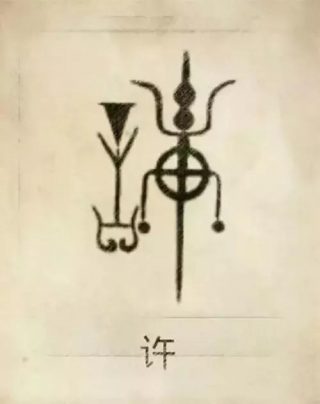The Xu surname (xǔ) is one of the oldest and most culturally rich surnames in China. Its origins are deeply intertwined with Chinese mythology, historical events, and ethnic integration, making it a fascinating subject for anyone interested in Chinese history and culture. This article explores the origins, historical figures, cultural significance, and societal impact of the Xu surname, offering a glimpse into its enduring legacy.

Ⅰ、Origins of the Xu Surname: From Sage Hermits to Ancient Kingdoms
The Xu surname has a diverse and storied origin, blending legend, history, and cultural evolution.
1.The Sage Xu You: A Symbol of Integrity
The earliest ancestor of the Xu surname is said to be Xu You, a revered hermit during the reign of Emperor Yao (circa 24th century BCE). According to legend, Emperor Yao offered his throne to Xu You due to his wisdom and virtue. However, Xu You declined and chose to live in seclusion, symbolizing humility and detachment from power. His descendants adopted "Xu" as their surname, forming the primary lineage.
2.The Ancient Xu State: A Legacy of Resilience
During the Western Zhou Dynasty (1046–771 BCE), Emperor Cheng granted the territory of Xu (modern-day Xuchang, Henan) to Jiang Wenshu, a descendant of the legendary Emperor Yan. The Xu State thrived for centuries but was eventually conquered by the Chu State in 375 BCE. After its fall, the people of Xu adopted the name of their former kingdom as their surname.
3.Ethnic Integration: A Tapestry of Cultures
The Xu surname also reflects China's history of ethnic diversity. Over time, several minority groups, including the Manchu, Li, and Yao peoples, adopted the Xu surname during periods of cultural assimilation. This blending of traditions highlights the inclusive nature of Chinese civilization.
Ⅱ、Historical Figures: From Scholars to Olympic Champions
The Xu surname has been associated with numerous influential figures across Chinese history, spanning philosophy, military, arts, and sports.
1.Pioneers of Thought and Scholarship
Xu Shen (58–147 CE): Known as the "Sage of Characters," Xu Shen authored Shuowen Jiezi (Explaining Simple and Analyzing Compound Characters), the first comprehensive dictionary of Chinese characters. His work laid the foundation for the study of Chinese linguistics.
Xu Heng (1209–1281): A prominent Confucian scholar during the Yuan Dynasty, Xu Heng played a key role in integrating Confucian ideals into the governance of the Mongol-led empire. He also contributed to the revision of the Shoushi Calendar, advancing astronomical science.
2.Military and Political Legends
Xu Chu (2nd–3rd century CE): A fierce general serving under the warlord Cao Cao during the Three Kingdoms period, Xu Chu was renowned for his bravery and loyalty.
Xu Shao (150–195 CE): A political commentator of the Eastern Han Dynasty, Xu Shao initiated the "Monthly Character Appraisal" system, which evaluated individuals' moral and political qualities. His famous assessment of Cao Cao as a "capable minister in peaceful times and a cunning hero in chaotic times" remains widely cited.
3.Cultural and Sporting Icons
Xu Hun (9th century): A Tang Dynasty poet, Xu Hun is celebrated for his evocative verses, including the famous line, "The wind fills the tower as the mountain rain approaches."
Xu Haifeng ( b. 1957): A modern-day hero, Xu Haifeng won China's first Olympic gold medal in shooting at the 1984 Los Angeles Games, symbolizing the nation's rise in international sports.
Ⅲ、Cultural Significance: Family Values, Architecture, and Traditions
The Xu surname is deeply rooted in Chinese cultural practices, from family ethics to architectural heritage.
1.Family Teachings and Ethical Codes
The Xu family's ancestral teachings emphasize values such as filial piety, loyalty, and diligence. For example, the Xu Family Instructions from Guangdong stress the importance of "each person fulfilling their role in society," reflecting the Confucian ideal of social harmony.
2.Architectural Heritage
The Xu Village in Anhui Province is a living museum of Huizhou-style architecture, featuring intricate carvings and traditional layouts. The village's ancestral halls serve not only as places of worship but also as repositories of family history and cultural memory.
3.Festivals and Intangible Heritage
The Xu surname is celebrated through vibrant traditions, such as the "Big Sword Lantern Festival" in Xu Village. This annual event, held in honor of the Tang Dynasty hero Xu Yuan, features a spectacular dance with a 10-meter-long sword, symbolizing strength and unity.
Ⅳ、Societal Impact: From Ancient Migrations to Modern Contributions
The Xu surname has left an indelible mark on Chinese society, shaping its cultural and historical landscape.
1.Migration and Population Spread
From the fall of the Xu State to the Ming and Qing Dynasties, Xu descendants migrated across China, settling in regions such as Fujian and Taiwan. Their journeys contributed to the cultural and economic development of these areas.
2.Political and Economic Contributions
During the Ming Dynasty, the Xu family played a significant role in maritime trade, fostering connections across East Asia. In modern times, figures like Xu Chengyao, a pioneer in the study of Huizhou culture, have preserved and promoted China's rich heritage.
3.Modern Achievements
The Xu surname continues to shine in fields such as science and the arts. Xu Genjun, a molecular biologist, contributed to the groundbreaking synthesis of insulin, while Ann Hui (Xu Anhua), a renowned filmmaker, has enriched global cinema with her poignant storytelling.
Ⅴ、Conclusion: A Living Legacy
The Xu surname is more than a family name—it is a microcosm of Chinese civilization, embodying values of wisdom, resilience, and cultural diversity. From the ancient sage Xu You to the modern achievements of Xu Haifeng, the Xu legacy reminds us that while individuals may fade, the spirit of a culture endures. For those interested in Chinese history, the story of the Xu surname offers a unique window into the heart of China's past and present.